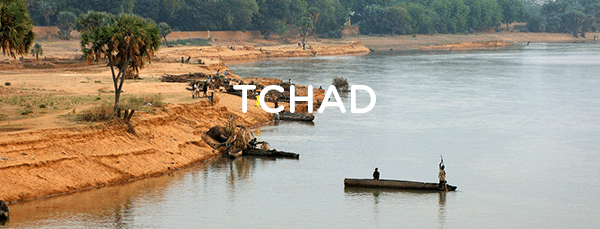|
| |
L’actualité de ces deux dernières semaines a été marquée par l’ouverture du pré-dialogue à Doha entre le gouvernement de transition et les rebelles. L’objectif de ces discussions était de permettre la participation de tous les groupes rebelles tchadiens au dialogue national inclusif prévu à N'djamena, au mois de mai. La sélection des participants a engendré des critiques parmi plusieurs groupes rebelles. Dans le reste de l’actualité, Monseigneur Djitangar Goetbé Edmond a appelé à l’unité tchadienne pour éviter les crimes intercommunautaires à l’avenir. Par ailleurs, le sultan de Sila appelle au brassage ethnique dans les villages des provinces pour éviter le tribalisme. Le docteur Hissein Massar, ancien conseiller de la présidence tchadienne, a également affirmé que les populations arabophones sont indispensables à la stabilité au Tchad. The news of the past two weeks has been marked by the opening of the pre-dialogue in Doha between the transitional government and the rebels. The objective of these discussions was to allow the participation of all Chadian rebel groups in the inclusive national dialogue planned for N'djamena in May. The selection of participants has generated criticism among several rebel groups. In other news, Bishop Djitangar Goetbé Edmond called for Chadian unity to avoid inter-communal crimes in the future. In addition, the Sultan of Sila called for ethnic mixing in the villages of the provinces to avoid tribalism. Dr. Hissein Massar, a former advisor to the Chadian presidency, also said that Arabic-speaking populations are essential to stability in Chad.
|
|
|
|
| |
L'info phare - Source médiatique
|
|
|
|
| |
|
Ouverture du pré-dialogue entre le pouvoir et les groupes rebelles à Doha
Le pré-dialogue entre le pouvoir et les groupes politico-militaires tchadiens s’est ouvert le 13 mars, à Doha. L’objectif de ces discussions était de permettre la participation de tous les groupes rebelles tchadiens au dialogue national inclusif prévu à N'djamena, au mois de mai. Il s'agit donc d'une étape importante sur la voie de la réconciliation nationale. Les travaux ont cependant été suspendus en fin de matinée avant d’être repris après une semaine de tractations et d’alliances. Selon les représentants du Fact (important groupe rebelle), de nombreux groupes rebelles parmi les 59 invités sont en trop. Ils y voient une stratégie destinée, selon eux, à diluer la voix des principaux groupes armés dans la négociation.
|
|
Opening of pre-dialogue between the government and rebel groups in Doha
The pre-dialogue between the government and Chadian politico-military groups opened on March 13 in Doha. The objective of these discussions was to allow the participation of all Chadian rebel groups in the inclusive national dialogue planned for N'djamena in May, making it an important step on the road to national reconciliation. However, work was suspended late this morning before being resumed after a week of negotiations and alliances. According to representatives of the Fact (a major rebel group), many of the 59 rebel groups invited to the meeting are in excess. They see this as a strategy to dilute the voice of the main armed groups in the negotiations.
|
|
|
|
|
|
| |
|
L’épiscopat tchadien appelle à l’unité pour l’avenir du Tchad
Au cours d’un entretien accordé à N’Djaména Hebdo, l’archevêque métropolitain de N'Djaména, Monseigneur DjitangarGoetbé Edmond, est revenu sur les récentes tragédies d’Abéché et de Sandanan, et a évoqué le dialogue national en préparation. Il a ainsi affirmé être “convaincu qu’un Tchad nouveau naîtra si nous sommes capables de tuer la haine et le mépris qui encombrent nos cœurs”. Il a notamment appelé la justice tchadienne a agir pour éviter que les civils s’estimant lésés par les attaques intercommunautaires ne cherchent à se faire justice eux-mêmes. Selon lui, il en va de la stabilité du Tchad : “ aux gouvernants d’agir avec responsabilité pour appliquer la loi et rétablir la justice dans les relations entre les citoyens. Alors le peuple se sentira sécurisé et aura confiance en ses gouvernants”.
|
|
Chadian bishops call for unity for the future of Chad
In an interview with N'DjaménaHebdo, the metropolitan bishop of N'Djaména, Bishop DjitangarGoetbé Edmond, spoke of the recent tragedies in Abeche and Sandanan, and the national dialogue that is being prepared. He said, "I am convinced that a new Chad will be born if we are able to kill the hatred and contempt that clutter our hearts. He called on the Chadian justice system to act to prevent civilians who feel aggrieved by inter-community attacks from seeking justice for themselves. According to him, the stability of Chad depends on it: "It is up to those in power to act responsibly to apply the law and restore justice in relations between citizens. Then the people will feel secure and have confidence in their leaders.
|
|
|
|
|
|
| |
|
Le sultan de Sila appelle au brassage ethnique dans les villages des provinces
Moustapha Seïd Brahim, sultan de Dar-Sila a lancé un appel pour promouvoir le vivre-ensemble. Dans le département de Kimiti, le sultan a condamné le phénomène d’insécurité qui a fait plusieurs morts dans sa localité. Afin de prévenir de nouveaux conflits citoyens, le sultan a demandé à la population d’éviter le tribalisme. Selon lui, tout le monde doit s’impliquer pour la cohésion sociale, la cohabitation pacifique et le brassage entre les communautés. Par ailleurs, il a exhorté la population à réciter plusieurs fois le Coran.
|
|
The Sultan of Sila calls for ethnic mixing in the villages of the provinces
Moustapha Seïd Brahim, Sultan of Dar-Sila launched an appeal to promote living together. In the department of Kimiti, the sultan condemned the phenomenon of insecurity that has caused several deaths in his locality. In order to prevent new citizen conflicts, the sultan asked the population to avoid tribalism. According to him, everyone must get involved for social cohesion, peaceful cohabitation and mixing between communities. He also urged the population to recite the Koran several times.
|
|
|
|
|
|
| |
|
Selon le Docteur Hissein Massar, les arabophones sont indispensables à la stabilité au Tchad
L’ancien conseiller à la présidence de la République tchadienne, le docteur Hissein Massar, a déclaré que les autorités de transition actuelle doivent rendre les citoyens égaux sans discrimination quelconque. Selon lui, il est indispensable que les autorités de transition soutiennent la langue arabe et la place des arabophones dans les prises de décisions.
|
|
According to Dr. Hissein Massar, Arabic speakers are essential to stability in Chad
Dr. Hissein Massar, former advisor to the Presidency of the Republic of Chad, said that the current transitional authorities must make citizens equal without any discrimination. According to him, it is essential that the transitional authorities support the Arabic language and the place of Arabic speakers in decision making.
|
|
|
|
|
|
| |
|
Un mois après les violences intercommunautaires de Sandana, les familles réclament justice
Au Tchad, les familles des victimes réclament justice, plus d’un mois après le massacre du 9 février 2022, qui a opposé éleveurs et agriculteurs et occasionné une douzaine de morts à Sandana, dans la région du Moyen-Chari. Les cinq personnes arrêtées n’ont pas été traduites devant les tribunaux. Les avocats des victimes dénoncent l’inaction des pouvoirs publics. Le président du Conseil militaire de transition, Mahamat Idriss DébyItno, était quant à lui dans la province, il y a dix jours. Il a rencontré des représentants des familles de victimes et promis que la justice fera son travail.
|
|
One month after the inter-community violence in Sandana, the families demand justice
In Chad, the families of the victims are demanding justice, more than a month after the February 9, 2022 massacre that pitted herders against farmers and left a dozen dead in Sandana in the Moyen-Chari region. The five individuals arrested have not been brought to trial. Lawyers for the victims denounced the government's inaction. The president of the Transitional Military Council, MahamatIdrissDébyItno, was in the province ten days ago. He met with representatives of the victims' families and promised that justice would be done.
|
|
|
|
|
|
| |
|
Une conférence-débat sur la paix organisée à Abéché
La sous-coordination nationale pour la paix d’appui au Conseil Militaire de Transition dans la province du Ouaddaï, a organisé une conférence-débat à Abéché. Cette organisation propose une campagne de sensibilisation sur la paix et le renforcement de la cohésion sociale en cette période de transition, afin de permettre aux autorités du CMT d'achever cette phase cruciale avec succès.
|
|
A conference-debate on peace organized in Abéché
The national peace sub-coordination in support of the Transitional Military Council in Ouaddaï province organized a conference-debate in Abeche. This organization is proposing an awareness campaign on peace and the strengthening of social cohesion during this transitional period, in order to enable the TMC authorities to successfully complete this crucial phase.
|
|
|
|
|
|
| |
Ce bulletin de veille est réalisé par l’Observatoire Pharos, observatoire du pluralisme des cultures et des religions, dans le cadre de son analyse de la situation du pluralisme culturel et religieux en Afrique centrale. Il rassemble des informations, analyses et déclarations qui ne reflètent pas systématiquement la perception de la situation par l’Observatoire Pharos, mais qui constituent des documents à intégrer dans l’analyse. Les destinataires, partenaires de l’Observatoire Pharos, sont invités à contribuer à la qualité de cette veille par le partage de toutes informations utiles et diffusables. This newsletter is written by Pharos Observatory, an observatory of cultural and religious pluralism, as par of its analysis of religious and cultural pluralism in Central Africa. It gathers information, analyses and speeches which may not reflect Pharos Observatory's feeling about the situation, but which should be taken into account as part of the analysis. All recipients, who are Pharos Observatory partners, are encouraged to contribute to this Watch by sharing any information that is worthwhile and fit to print.
|
|
|
|




